Park Ji-sung is regarded as one of the most successful Asian footballers of all time and the most decorated South Korean soccer star ever.
The former South Korean professional player is a highly respected soccer icon whose exploits on the pitch are still vividly remembered by football lovers. He has had many ‘firsts’ as a South Korean footballer including being the very first South Korean player to win the UEFA Champions League as well as the first to score in three consecutive World Cup tournaments.
Park Ji-sung Biography
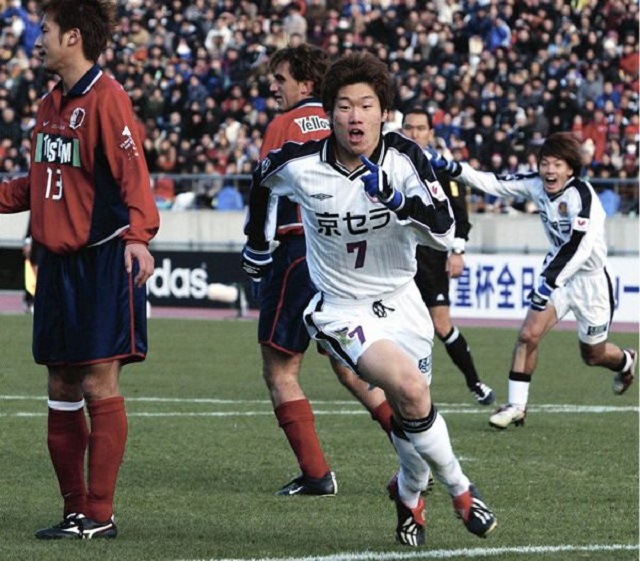
Park Ji-sung is a full-blooded South Korean. He was born in Goheung, a county in Jeollanam-do. Jeollanam-do is a province in southwest South Korea. Park was born on 25 February 1981 and is now 37 years old.
He grew up largely in Suwon which happens to be the capital city and largest metropolis of Gyeonggi-do in South Korea. It was here that Park developed an interest in football.
Park Ji-sung’s father is Park Sung-jong and his mother is Jang Myung-Ja. His parents are on record as having devoted time and energy to helping him develop as a footballer and achieve his dreams. His father for instance even went the extra mile by making him drink boiled frog juice to gain strength and help him increase in size and gain more strength to play football because he was smallish and frail.
Park’s father usually traveled from Suwon where they lived to Goheung just to gather some wild frogs for his son. After gathering the frogs, he would proceed to boil them and then make Park drink the juices.
Park Ji-sung Early Career
Park began to play football during his fourth year at elementary school and his skills caught instant attention. He was particularly hailed for his dribbling skills and accurate passes. At the time, his fame began to travel as a youngster to watch out for. When he began High School, Park continued to play football and became so good that different clubs began to look at him for a possible signing. He was also popular among the fans.
From 1996 to 1999, the footballer was in high school, and during this time, he worked to cement his place as one of the best talents in South Korea. In fact, in 1998 he helped his school to win the national championship. It was during this same period that the talk about his small stature started gaining ground. Many clubs initially rejected him for his small build and seeming lack of strength.
Upon leaving High School, Park soon made it into the soccer team of Myongji University and later became a member of the South Korean Olympics Team when Myongji University’s soccer team was invited to train with the Olympic team. His performance was noticed and he soon made it into the South Korean national team making his debut on the 5th of April 2000 in an AFC Asian Cup qualification match against Laos.
Park went on to do so well that even while still a second-year student at Myongji University, he was offered a contract by Kyoto Purple Sanga, a professional Japanese club. This deal kick-started his professional career.
Professional Career
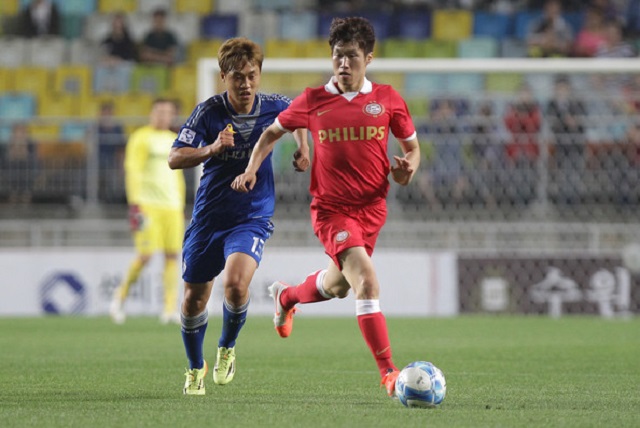
Park began his professional career in 2000 by signing for Kyoto Purple Sanga. He hit the ground running and helped the club to win the Japanese J2 League title in 2001. The title win saw them being promoted to the J1 League.
The next season in 2002, Park was very instrumental in leading the team to the finals of the Emperor’s Cup. During the final, Kyoto Purple Sanga was losing to their rivals but Park stepped up and scored the equalizer with a stunning header before providing an assist which saw them win the competition for the very first time in Sanga’s history. In total, Park had 85 appearances for the club and scored 12 goals.
After winning the Emperor’s Cup with Kyoto Purple Sanga, Park Ji-sung moved to the Netherlands in 2003 to play for PSV Eindhoven after being invited there by Guus Hiddink, the club’s coach. Park initially started very slowly at PSV Eindhoven because he soon began struggling with injuries. However, he bounced back during the 2004–05 season following the departure of Arjen Robben from the club to Chelsea.
When Arjen Robben left, Park started getting more starting time and this was when he began to dazzle fans with his incredible skills and stamina. Park went on to form the backbone of PSV Eindhoven’s midfield along with four other players; DaMarcus Beasley, Johann Vogel, Mark van Bommel, and Philip Cocu. His fast pace and sharp accuracy in passing were part of his many highlights.
His performance for PSV Eindhoven that season was so superb that he was nominated for the 2005 UEFA Best Forward award alongside other football greats like Ronaldinho, Andriy Shevchenko, Samuel Eto’o, and Adriano. Also, fans were so impressed with his outing that they wrote a song for him. The song which was titled “Song for Park”, has now been included on the official PSV Eindhoven album called “Kampioen”.
Park Ji-sung Moves To England (Manchester United)
Park left PSV Eindhoven in 2005 and moved to England where he joined the premier league club, Manchester United for £6.5 million. It was at Manchester United that Park did his most recognized exploits. Three months after he joined Manchester United, Park became the very first Asian footballer to captain the club. This happened during a Champions League home group match against Lille when he took the captain armband from Ryan Giggs as he replaced him.
It does not take long for someone like Park to make an impression on the pitch anywhere. Fans soon began to savor every move Park made on the field. He was especially really good in his passes as well as in his dribbling. His energy in the midfield was also legendary as he coordinated things perfectly well. However, even though he created many brilliant chances for goals to happen, Park didn’t officially score his own first goal until April 2006 when he found the back of the net against Arsenal.
The next year in 2007, Park became the very first Asian footballer to ever win the Premier League title after powering Manchester United with his towering contributions in the midfield. Even though he was sidelined by injury for most of that season, he played enough matches to leave the fans awed with his performance, and even Alex Ferguson, his coach praised his output for the team.
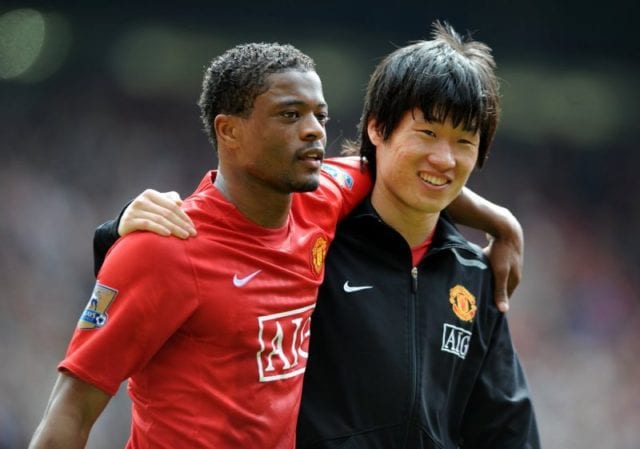
Park was ecstatic over the Premier League title win! He had made history, but more was to come because just one year later, in 2008, he became the first Asian soccer star to ever win the UEFA Champions League, the biggest football trophy in Europe. It is noteworthy though that Park was omitted from the Manchester United squad that played the Champions League final even though he was very instrumental in the team’s progress to the final in the first place. This notwithstanding, Park’s name became super-popular among Asians. He was their hero. And for Manchester United fans, Park was a maestro whose talented display they were grateful to experience.
The same year in 2008, Park was included in the squad for the FIFA Club World Cup and went on to win the trophy becoming the first Asian to win it. With the win, Manchester United also became the first English club to clinch the FIFA Club World Cup title.
When Manchester United advanced to the semi-finals of the Champions League on 15 April 2009 by defeating Porto, Park became the only Asian football star to ever play in the Champions League semi-finals on four different occasions.
After agreeing to sign a four-year £50,000-a-week deal at Manchester United on 2 May 2009, Park Ji-sung went on to make 26 appearances, scoring 4 goals in the process that season. Park scored his first Champions League goal for Manchester United on 5 May 2009 during the second leg of the semi-final match against Arsenal thus helping the team to progress to the final. This made Park the first Asian player to ever play in the Champions League final. However, they lost the final to Barcelona.
Park went on to make dizzying exploits for the club including scoring a crucial winner for Manchester United with a diving header when he played against Liverpool. By this time fans were already calling Park “Three Lung Park” because of his impressive fitness. That year he grabbed the Player of the Month award for two months in a row.
Early in 2011, Park was ruled out of action due to a hamstring injury, however, he bounced back soon afterward, scoring the winning goal in a Champions League quarter-final second-leg tie against Chelsea. After losing to Barcelona again in the Champions League final that season, Manchester United went on the United States tour and Park was named man of the match in the final game following his sterling performance which saw the team winning by 4 goals over the rivals.
In 2012, Park made his 200th appearance for Manchester United in a game against Chelsea, thereby becoming the 92nd player in the history of the club to reach the milestone. That season, Park made 28 appearances and scored 3 goals in the process.
Overall, Park played for Manchester United 205 times playing as a midfielder, and scored 27 goals. He is considered one of the best midfielders in Manchester United’s history.
The football star left Manchester United in 2012 and joined Queens Park Rangers (QPR), another Premier League club for an undisclosed fee. However, Park was largely unsuccessful at QPR. In fact, despite being made captain, he kept battling with injuries and a lack of form. This ensured that Park didn’t make much impact at all. QPR was later relegated from the Premier League.
When Park finished the season, he had only made 20 Premier League appearances and had no goals to his name.
Park moved back to the Netherlands and joined PSV Eindhoven on loan in the 2013–14 season. Shortly after in May 2014, he announced his retirement from football. By this time, He had played 27 times for the club and scored 2 goals.
Park Ji-sung’s International Career
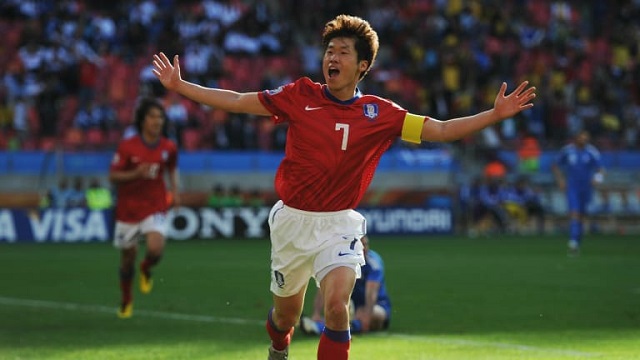
Ji-sung made his debut as an international footballer for South Korea during the 2000 Sydney Olympics U-23 regional qualifier. He was just 19 years old and plays as a defensive midfielder. He went on to make a lot of other appearances for his country.
During the 2002 FIFA World Cup, Park became the hero of South Koreans with his mesmerizing displays during the tournament. One of his finest displays was against Portugal during the group stages. Portugal was highly favored to beat South Korea but Park had other plans.
In the 70th minute of the game, Park controlled the ball in his chest and then volleyed it through the keeper’s legs into the net after beating the Portugal defenders. His stunning goal knocked out Portugal and sent South Korea through to the knockout stages of the tournament for the first time in their history. South Korea would later advance to the semi-final of the tournament after beating Italy and Spain.
When Park took part in the 2006 World Cup, he went in with the same zeal with which he went in for the 2002 tournament. He was even voted man of the match after scoring the equalizer against France during their group game.
Park became legendary as a football star for South Korea and was made the team captain in 2008 during the qualification campaign for the 2010 World Cup. He ended the campaign as the highest goalscorer with five goals.
See Also: Marcelo Balboa: Biography, Wife, Parents, Stats, And Net Worth
During the World Cup proper, Park scored a goal in a group-stage match against Greece. That made him the first South Korean to score in three consecutive World Cup tournaments.
Park eventually confirmed his retirement from international football on 31st January 2011 after taking part in the AFC Asian Cup. Overall, he had made as many as 100 appearances for the national team, scoring 13 goals.
Who Are Park Ji-sung’s Wife And Kids?
The football player is married to Kim Min-ji, a former television reporter. They got married on 27 July 2014 in South Korea. They currently have two children; a daughter and a son.
Park Ji-sung’s Net Worth
Park’s current net worth has been pegged at $15 million. The former footballer has signed a 10-year sponsorship deal worth £ 333,000 a year with Nike. This happens to be the biggest deal Nike has ever awarded to any Asian sportsperson.
He also has other investments including a football academy, a museum, and a charity called JS Foundation. In addition to this, Park has been revealed to have a long-running sponsorship deal with Asiana Airlines. This deal is reportedly worth a massive £ 125,000 a year including free first-class tickets both for himself as well as for his family.
Emperor’s Cup: 2002
KNVB Cup: 2004–05
Johan Cruyff Shield: 2003
Football League Cup: 2005–06, 2008–09, 2009–10
FA Community Shield: 2007, 2008, 2010, 2011
UEFA Champions League: 2007–08
FIFA Club World Cup: 2008
AFC Asian Cup third-place: 2000, 2011





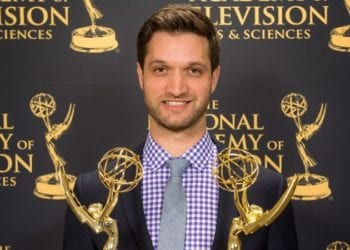



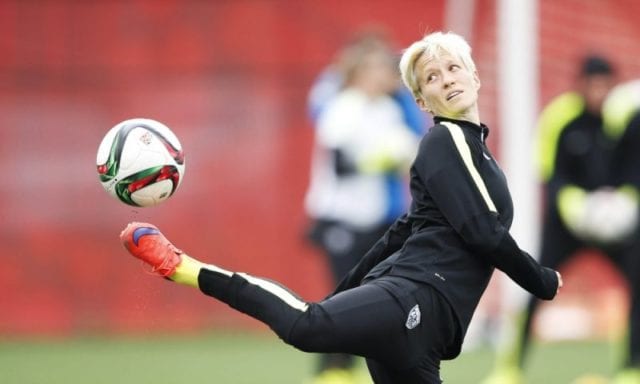
Discussion about this post